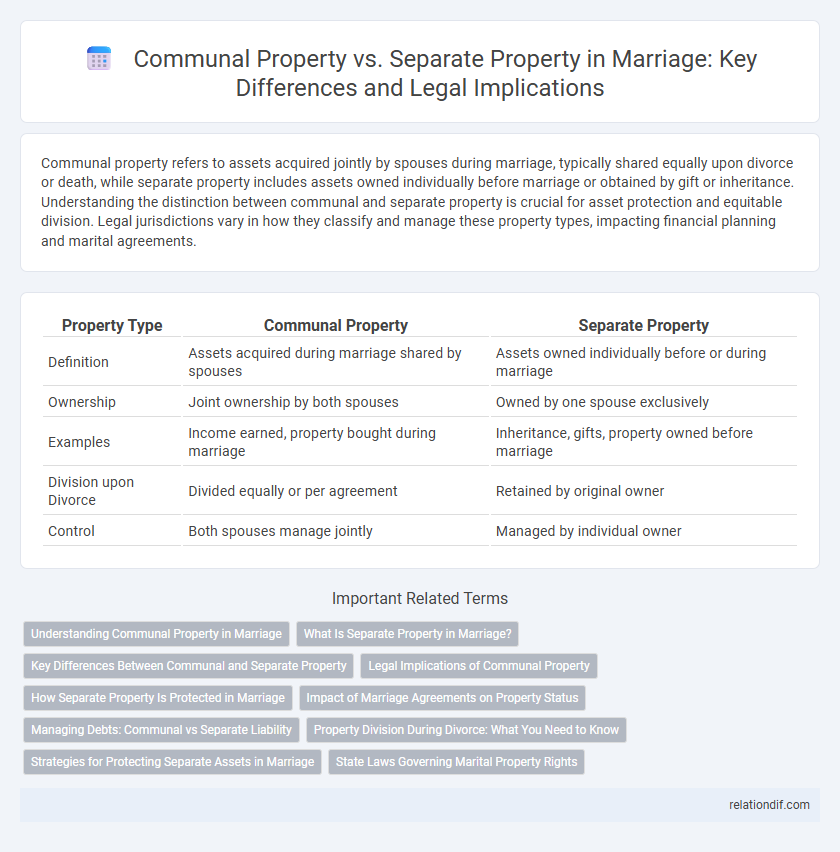Communal property refers to assets acquired jointly by spouses during marriage, typically shared equally upon divorce or death, while separate property includes assets owned individually before marriage or obtained by gift or inheritance. Understanding the distinction between communal and separate property is crucial for asset protection and equitable division. Legal jurisdictions vary in how they classify and manage these property types, impacting financial planning and marital agreements.
Table of Comparison
| Property Type | Communal Property | Separate Property |
|---|---|---|
| Definition | Assets acquired during marriage shared by spouses | Assets owned individually before or during marriage |
| Ownership | Joint ownership by both spouses | Owned by one spouse exclusively |
| Examples | Income earned, property bought during marriage | Inheritance, gifts, property owned before marriage |
| Division upon Divorce | Divided equally or per agreement | Retained by original owner |
| Control | Both spouses manage jointly | Managed by individual owner |
Understanding Communal Property in Marriage
Communal property in marriage refers to assets and debts acquired during the marriage that are jointly owned by both spouses, regardless of whose name is on the title. Understanding the distinction between communal property and separate property, which includes assets owned prior to marriage or received as gifts or inheritances, is crucial for equitable division during divorce or legal separation. Many jurisdictions apply community property laws that equally divide communal assets, emphasizing the importance of clear documentation and legal advice to protect individual interests.
What Is Separate Property in Marriage?
Separate property in marriage refers to assets owned individually by one spouse before the marriage or acquired during the marriage by gift, inheritance, or personal injury awards. This property remains exclusively in the name of the individual spouse and is not subject to division upon divorce. Accurate documentation and clear tracing of the asset's origin are essential to establish and protect separate property rights.
Key Differences Between Communal and Separate Property
Communal property refers to assets acquired jointly by spouses during marriage, typically subject to equal division upon divorce, while separate property includes assets owned individually before marriage or received as gifts or inheritances. Key differences involve ownership rights, management, and division, with communal property generally pooled and separate property retained individually. Legal treatment varies by jurisdiction, impacting financial responsibility and inheritance upon dissolution of marriage.
Legal Implications of Communal Property
Communal property in marriage refers to assets and debts acquired jointly by spouses during the union, subject to shared ownership and management rights under family law. Legal implications include equitable division upon divorce or death, protection against unilateral sale or disposal, and entitlement to spousal claims for debts and liabilities. Courts often examine the nature and origin of property to differentiate communal from separate property, influencing inheritance rights and financial obligations between spouses.
How Separate Property Is Protected in Marriage
Separate property in marriage is protected through clear documentation such as prenuptial agreements and proper asset titling before the union. Courts typically recognize inherited assets, gifts, and property owned prior to marriage as separate, provided they remain unmingled with marital assets. Maintaining accurate financial records and avoiding commingling with communal property ensures legal protection of individual ownership rights during marital dissolution.
Impact of Marriage Agreements on Property Status
Marriage agreements, including prenuptial and postnuptial contracts, significantly influence the classification of assets as communal or separate property. These legal documents explicitly define the ownership and division of property during marriage and in the event of divorce, overriding default state laws governing marital property. By clearly stipulating which assets remain separate and which become communal, marriage agreements provide couples with greater control over financial outcomes and asset protection.
Managing Debts: Communal vs Separate Liability
In marriage, managing debts depends on whether they are classified as communal or separate property. Communal debts, accrued during the marriage, are typically shared equally by both spouses regardless of whose name is on the account. Separate debts, incurred before marriage or through individual actions, remain the sole responsibility of the spouse who incurred them, protecting the other from shared liability.
Property Division During Divorce: What You Need to Know
Property division during divorce varies significantly between communal property and separate property systems. Communal property entails equal sharing of assets acquired during marriage, while separate property includes individually owned assets before marriage or received as gifts and inheritances. Understanding state laws on community property or equitable distribution is crucial to determine rights and obligations in dividing marital assets.
Strategies for Protecting Separate Assets in Marriage
Establishing a prenuptial agreement is a critical strategy for defining and protecting separate property in marriage, ensuring assets acquired before marriage remain individual. Maintaining meticulous records of separate property and avoiding commingling with communal assets preserves clarity and legal distinction. Implementing clear financial boundaries and consulting legal professionals helps safeguard individual ownership rights throughout the marriage.
State Laws Governing Marital Property Rights
State laws governing marital property rights vary significantly, with some states adopting community property rules where assets acquired during marriage are jointly owned, while others follow equitable distribution principles to divide property fairly but not necessarily equally. In community property states such as California and Texas, both spouses have equal ownership of marital property, but separate property acquired before marriage or through inheritance remains individual. Understanding specific state statutes is crucial for determining property division upon divorce or death, as these laws dictate spouses' rights to ownership, control, and division of assets.
communal property vs separate property Infographic

 relationdif.com
relationdif.com